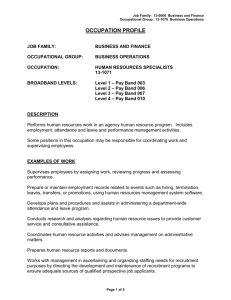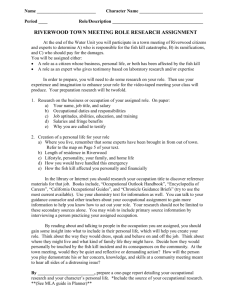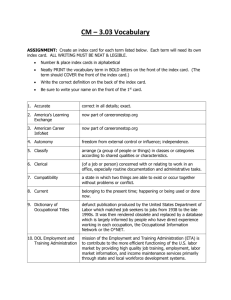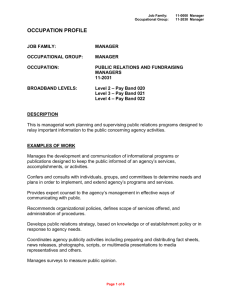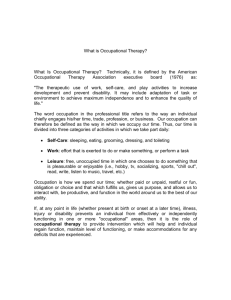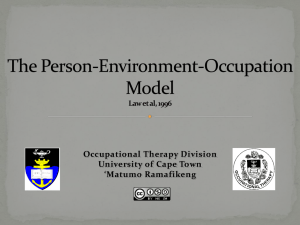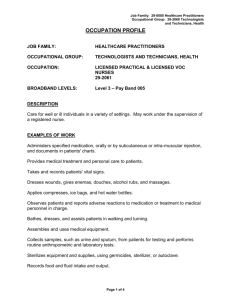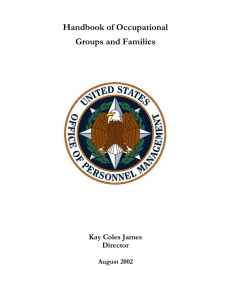fisheries and wildlife biologists
advertisement
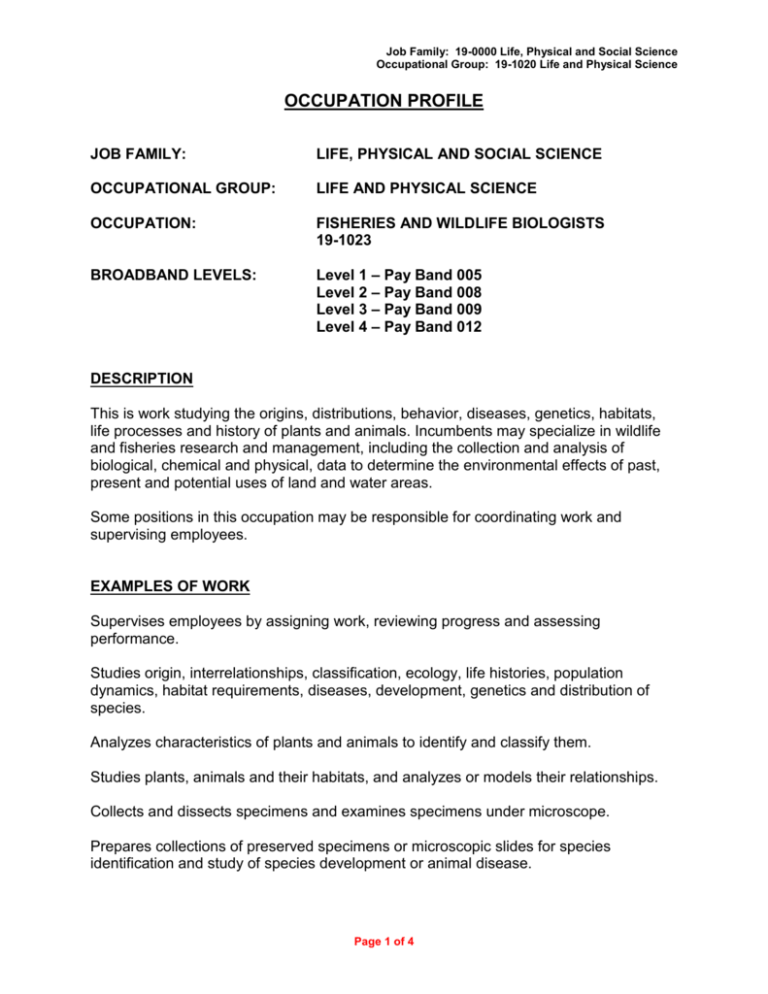
Job Family: 19-0000 Life, Physical and Social Science Occupational Group: 19-1020 Life and Physical Science OCCUPATION PROFILE JOB FAMILY: LIFE, PHYSICAL AND SOCIAL SCIENCE OCCUPATIONAL GROUP: LIFE AND PHYSICAL SCIENCE OCCUPATION: FISHERIES AND WILDLIFE BIOLOGISTS 19-1023 BROADBAND LEVELS: Level 1 – Pay Band 005 Level 2 – Pay Band 008 Level 3 – Pay Band 009 Level 4 – Pay Band 012 DESCRIPTION This is work studying the origins, distributions, behavior, diseases, genetics, habitats, life processes and history of plants and animals. Incumbents may specialize in wildlife and fisheries research and management, including the collection and analysis of biological, chemical and physical, data to determine the environmental effects of past, present and potential uses of land and water areas. Some positions in this occupation may be responsible for coordinating work and supervising employees. EXAMPLES OF WORK Supervises employees by assigning work, reviewing progress and assessing performance. Studies origin, interrelationships, classification, ecology, life histories, population dynamics, habitat requirements, diseases, development, genetics and distribution of species. Analyzes characteristics of plants and animals to identify and classify them. Studies plants, animals and their habitats, and analyzes or models their relationships. Collects and dissects specimens and examines specimens under microscope. Prepares collections of preserved specimens or microscopic slides for species identification and study of species development or animal disease. Page 1 of 4 Job Family: 19-0000 Life, Physical and Social Science Occupational Group: 19-1020 Life and Physical Science Conducts experimental studies, using chemicals and various types of scientific equipment. Collects and analyses biological data on harvested or hunted species or determines the level of acceptable harvest Uses tools such as remote sensing and geographic information systems to analyze and model the spatial patterns and relationships of plants and animals in their environment. Raises plants and animals specimens for study and observation or for use in experiments, stocking, or species reintroduction programs. Studies plant and animal diseases or parasites. Recommends and conducts habitat restoration or management projects Plans and administers biological research or regulatory programs. Prepares scientific reports and publications. Measures salinity, acidity, light, oxygen content, and other physical conditions of water to determine their relationship to aquatic life. Studies and manages wild animal or aquatic populations. EXAMPLES OF JOB CHARACTERISTICS Identifying Objects, Actions, and Events Getting Information Needed to do the Job Identifying information received by making estimates or categorizations, recognizing differences or similarities, or sensing changes in circumstances or events. Observing, receiving, and otherwise obtaining information from all relevant sources. Analyzing Data or Information Identifying underlying principles, reasons, or facts by breaking down information or data. Monitor Processes, Material, Surroundings Monitoring and reviewing information from materials, events, or the environment, often to detect problems or to find out when things are finished. Compiling, coding, categorizing, calculating, tabulating, auditing, verifying, or processing information or data. Processing Information Page 2 of 4 Job Family: 19-0000 Life, Physical and Social Science Occupational Group: 19-1020 Life and Physical Science Documenting/Recording Information Entering, transcribing, recording, storing, or maintaining information in either written form or by electronic/magnetic recording. Updating and Using Job-Relevant Knowledge Keeping up-to-date technically and knowing one's own jobs' and related jobs' functions. Organizing, Planning, and Prioritizing Developing plans to accomplish work, and prioritizing and organizing one's own work. Controlling Machines and Processes Using either control mechanisms or direct physical activity to operate machines or processes (not including computers or vehicles). Making judgments about or assessing the value, importance, or quality of things or people. Judging Qualities of Things, Services, And/or People EXAMPLES OF KNOWLEDGE, SKILLS AND ABILITIES Science Using scientific methods to solve problems Information Gathering Knowing how to find information and identifying essential information Reading Comprehension Understanding written sentences and paragraphs in work related documents Information Organization Finding ways to structure or classify multiple pieces of information Active Learning Working with new material or information to grasp its implications Critical Thinking Using logic and analysis to identify the strengths and weaknesses of different approaches Problem Identification Identifying the nature of problems Idea Evaluation Evaluating the likely success of an idea in relation to the demands of the situation Page 3 of 4 Job Family: 19-0000 Life, Physical and Social Science Occupational Group: 19-1020 Life and Physical Science Idea Generation Generating a number of different approaches to problems Writing Communicating effectively with others in writing as indicated by the needs of the audience Coordination Adjusting actions in relation to others' actions Management of Personnel Resources Motivating, developing, and directing people as they work, identifying the best people for the job Biology Knowledge of plant and animal living tissue, cells, organisms, and entities, including their functions, interdependencies, and interactions with each other and the environment Mathematics Knowledge of numbers, their operations, and interrelationships including one or more of the following: arithmetic, algebra, geometry, calculus, statistics, and their applications LICENSURE, CERTIFICATION OR REGISTRATION REQUIREMENTS EFFECTIVE: History: 09/09/2002 07/01/2002 Page 4 of 4
